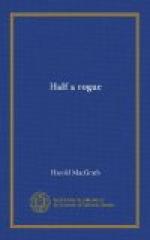Warrington had made a hurried purchase. As he left the cigar store, he saw the two men fall. He ran up quickly, wondering what the trouble was. He had no idea that John was one of the men, but as he saw the light grey suit, and the Panama lying on the ground, he knew.
“For God’s sake, John, what are you doing?” he cried.
With a superhuman effort he dragged the enraged man from the prostrate form in the road. It no longer struggled, but lay inert and without motion.
“Was I killing him, Dick?” said John, in a quavering voice. “He struck me and—Am I mad, or has the world turned upside down in a minute?”
“What did he say?” asked Warrington. He was badly frightened. He knelt at the side of Bolles and felt of his heart. It still beat.
“What did he say? Nothing, nothing!—Where’s my hat? I’m going home— Have I—?”
“No, he’s alive; but I came just in time.”
At this moment Bolles turned over and slowly struggled to a sitting posture. His hands went feebly toward his throat.
“He’s all right,” said Warrington. “We’d better light out. Now what the devil—”
“He struck me. He was drunk. I’ve been in a fighting mood all day. Call that carriage.”
When Mrs. Jack saw him she screamed.
“John!”
“The asphalt was wet, girl, and I took a bad fall.” But John lied with ill grace.
Chapter XIV
The Bennington mills, or shops, were situated just inside the city limits. Beyond was a beautiful undulating country of pastures and wheat-fields, dotted frequently with fine country homes. The mills were somewhat isolated from the general manufacturing settlement, but had spurs of track that for practical purposes were much nearer the main line of freight traffic than any of those manufacturing concerns which posed as its rivals. It was a great quadrangle of brick, partly surrounded by a prison-like wall. Within this wall was a court, usually piled high with coke and coal and useless molds. The building was, by turns, called foundry, mills and shops. The men who toiled there called it the shops. Day and night, night and day, there was clangor and rumbling and roaring and flashes of intense light. In the daytime great volumes of smoke poured from the towering chimneys, and at night flames shot up to the very walls of heaven, burnishing the clouds.
The elder Bennington was one of those men who, with a firm standing on the present, lay admirable plans for the future. He had been in no great hurry to get rich. He went leisurely about it, tantalizing fortune, it might be said. His first venture had shown foresight. At the beginning of the Civil War he had secured an option on many thousand tons of coal. Without taking an actual penny from his pockets, he had netted a comfortable fortune. Again, his foresight recognized that the day would




